Jack Charlton remembered: FourFourTwo celebrates the everlasting laughs of Giant Jack with those who knew him best
Last July, football mourned after losing one of its greatest ever characters; a man loved in not one but two nations thanks to his outstanding work as both a player and manager
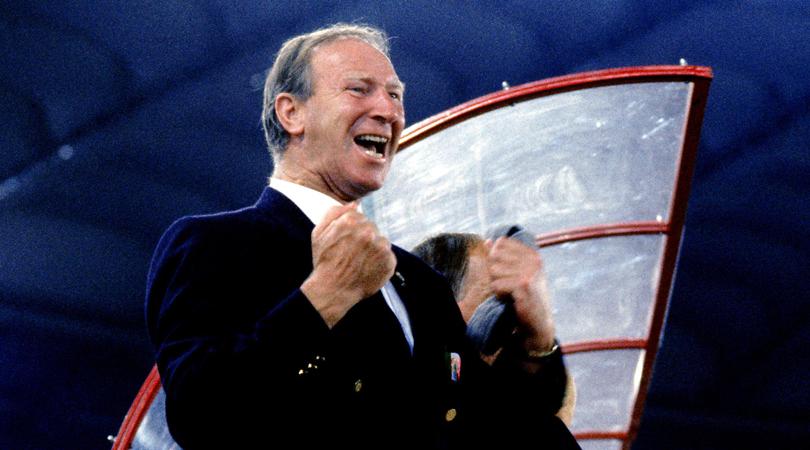
Jack Charlton, three votes. Johnny Giles, three votes. Liam Tuohy, three votes. Bob Paisley, nine votes. Deep in the bowels of Merrion Square, the FAI were choosing the new Republic of Ireland boss, and it wasn’t looking good for Big Jack.
In February 1986, the Boys in Green had never qualified for a major tournament, and had just had their World Cup hopes ended – beaten in the USSR, then demolished 4-1 by Denmark at Lansdowne Road. Worse still, Northern Ireland had qualified for a second time in succession. Eoin Hand was out, and it was time to decide his replacement. Charlton had been receptive to the FAI’s approach, but some voiced concerns about his acrimonious departure from Newcastle six months earlier. Some wanted a return for Giles or Tuohy, both former Ireland managers. Several people favoured Paisley, Liverpool’s three-time European Cup winner who had retired in 1983 but admitted interest in the vacancy anyway.
The voting wasn’t finished, though. Further ballots eliminated Tuohy and Giles from the race. Then, FAI president Des Casey refused to endorse Paisley – Liverpool had warned that the 67-year-old had health problems. In the end, Charlton prevailed and got the job, by 10 votes to eight.
The first Englishman to lead Ireland would become their greatest ever manager, in 10 incredible years at the helm. After World Cup glory in 1966, and domestic success at Leeds, it was a fitting end to an unforgettable career. To become a national hero in one country is quite a feat. Charlton did it in two – not just for his achievements, but through his sheer force of personality.
Obdurate with ball and mouth
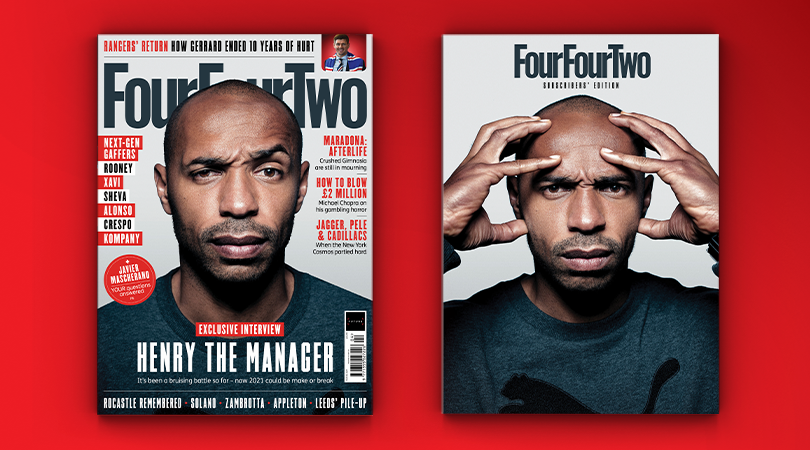
IN THE MAG Thierry Henry exclusive! Plus Rangers, Rocastle, Mascherano, Maradona, Chopra, Appleton and more
When Jack Charlton began his managerial career with Middlesbrough in the summer of 1973, his opening salvo wasn’t quite as extreme as Brian Clough’s ‘you can throw all your medals in the bin’ speech, but there were certainly similarities.
A year before Clough uttered his infamous line at Leeds, Charlton made his feelings clear on Teesside. As a World Cup winner taking over a Second Division outfit, however, his players were a tad more receptive. Boro had been mid-table when Stan Anderson got the sack in January 1973, but recovered to finish fourth – losing just three of 15 games under caretaker Harold Shepherdson.
“All of a sudden we had this icon in Jack Charlton coming in – we were excited and nervous,” recalls Jim Platt, Middlesbrough’s young goalkeeper back then. “He met us at a hotel, and the first sentence I remember him saying was, ‘You can forget those results you got at the end of last season. They mean f**k all, as you were playing teams who had nothing to fight for’. I thought, ‘Bloody hell, I thought we did quite well!’”
Get FourFourTwo Newsletter
The best features, fun and footballing quizzes, straight to your inbox every week.
Charlton had just retired as a player after 21 years with Leeds, his only club. At 15, he had snubbed a trial at Elland Road because he wanted to work alongside his father in the Northumberland coal mines – only to swiftly realise how unpleasant the job was. He then applied to join the police, before accepting Leeds’ trial offer and earning a deal.
He helped Leeds reach the First Division in 1955-56, but was never short of an opinion. Team-mate John Charles once pinned him against a wall after a full and frank exchange of views during one game. “Don’t ever speak to me like that again,” snarled the Welshman.
Leeds were relegated after Charles’ sale to Juventus. A mere four years before the 1966 World Cup, Charlton was part of a team that came 19th in the second tier, only avoiding relegation to the Third Division on the final day of the season. He had spent much of the campaign unhappily playing out of position as a centre-forward – he scored 12 goals, but endured a difficult early relationship with new boss Don Revie.
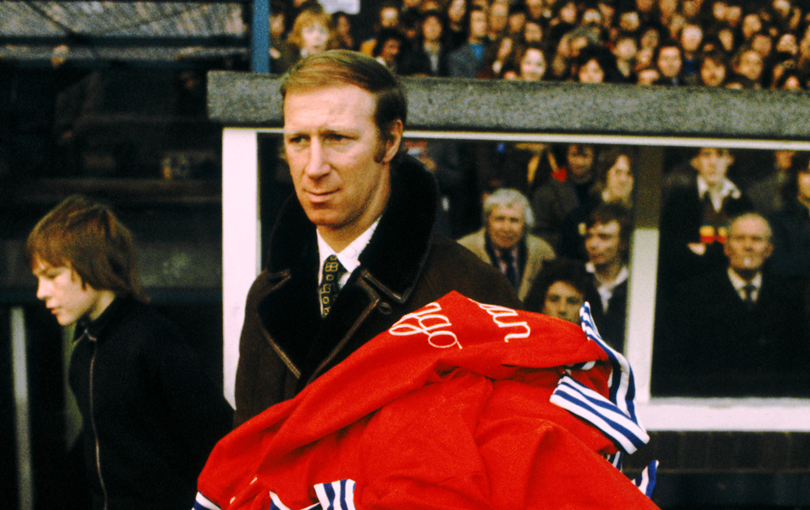
That summer, Revie told Charlton he could leave, yet Leeds rejected a £28,500 bid from Bill Shankly’s Liverpool – even though it was just £1,500 short of the asking price. Charlton was then on the verge of joining his younger brother Bobby at Manchester United, only for Matt Busby to delay the deal.
In the end, Charlton signed a new contract at Leeds. He soon forged a standout central defensive partnership with emerging stopper Norman Hunter, which would take the club to promotion in 1964, second place in the top tier a year later, and eventually the First Division title in 1969. They would also win the League Cup, FA Cup and two Fairs Cups.
Charlton was named the Football Writers’ Association’s Footballer of the Year in 1967 – two years after making his England debut in April 1965, a month before turning 30.
Leeds had just beaten Manchester United when he heard about his call-up – bursting into a sombre opposition dressing room to excitedly tell his brother, “I’ve been selected to play for England!”
“Ah, congratulations,” replied Bobby, who had made his international bow seven years earlier. “Now f**k off out of here,” another Red Devils player shouted.
Alf Ramsey saw the older Charlton brother as the perfect partner for Bobby Moore – Jack the no-nonsense destroyer to the ball-playing Bobby. England didn’t concede a goal at the World Cup until the last 10 minutes of their semi-final win over Portugal, when Charlton handled on the goal-line at 2-0 up. A straight red card and suspension from the final today, but back then he escaped even a booking. Eusebio converted the penalty but England won, before Geoff Hurst’s hat-trick heroics in the showpiece. The Charltons remain one of only two sets of brothers to lift the World Cup, following West German duo Fritz and Ottmar Walter in 1954’s ‘Miracle of Bern’.
In May 1973, the Charlton siblings both became managers in the same week: Bobby with Preston and Jack on his 38th birthday at Boro. He almost walked out before he had been appointed – having agreed to meet the board, he took umbrage when they started quizzing him. “Wait a minute,” he thundered. “I didn’t come here to be interviewed – I was told the job was mine.”
He then produced a hand-written note from Revie, outlining a manager’s responsibilities. Either Charlton was given final say on all of them, or he was leaving.
“I’ll sit outside while you read it,” he said. Fifteen minutes later, he knocked on the door. “I’m going to sit here for another 10 minutes – if you haven’t made your minds up by then, I’m off,” he added. He got the job.That summer, Revie told Charlton he could leave, yet Leeds rejected a £28,500 bid from Bill Shankly’s Liverpool – even though it was just £1,500 short of the asking price. Charlton was then on the verge of joining his younger brother Bobby at Manchester United, only for Matt Busby to delay the deal.
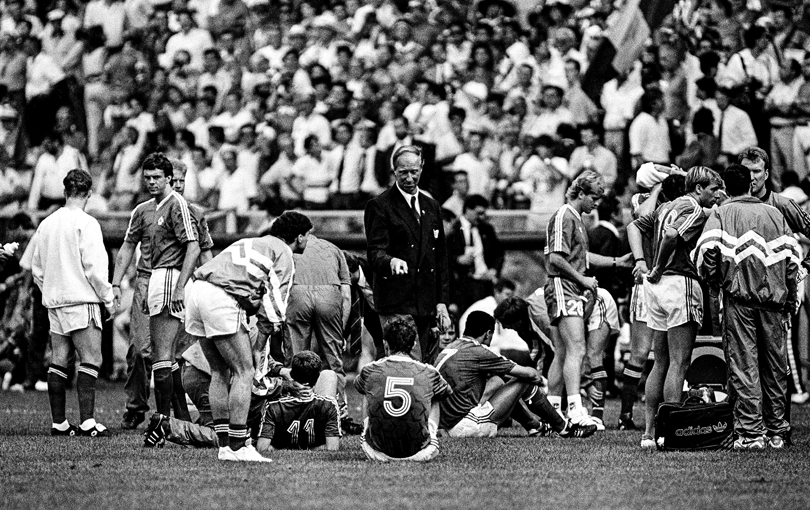
“We travelled to Portsmouth for Jack’s first match,” Platt tells FFT. “They had spent quite big, but we won 1-0. Then we played Fulham at home and lost 2-0 – that was the first time we saw him bad-tempered. He came in on Monday and apologised in a meeting on the pitch at Ayresome Park, but a couple of older lads had a go back and he lost his rag again. He said, ‘You either f**king do it my way, or you won’t do it at all’. We went more than 20 games undefeated after that.”
Charlton got the best out of a 20-year-old Graeme Souness, after initially leaving the young tyro out of his side.
“I wasn’t the best professional – I went out chasing ladies, but Jack sorted me out,” the Scot later recalled. “If it hadn’t been for him, I wouldn’t have achieved what I did.
“God forbid you ever got in his car, though – there would be feathers, dead pheasants, dead fish, geese. It stank...”
The manager would frequently go fishing or shooting. “He didn’t take training five days a week, because he felt we’d all get bored of him,” says Platt. “Two or three days a week, he’d go and do some shooting or fishing and let the first-team coach take training.” Charlton had an instinct for the minutiae of man-management.
“I’d had a bad game once, and was in the bath on my own,” explains Platt. “He just had a quiet word with me and said, ‘Son, you’ve saved us plenty of times this season, so don’t worry’. When he did team talks, though, he’d speak about the opposition and some of the pronunciations... we’d look around thinking, ‘Who’s he talking about?!’
“Another time, he put his feet up on the table and he had a big hole in his shoe–we were all nudging each other and sniggering. He shouted, ‘What’s so funny, what are you laughing at?’ He’d join in training, and once John Craggs tripped him – Jack chased after him saying, ‘I’ll get the little bastard!’ If Jack had actually caught up with John, I think he would have murdered him.”
Middlesbrough won the Second Division with six matches to spare – bagging the title with such ease that the boss attempted to orchestrate it so they sealed it at Ayresome Park. He was genuinely annoyed when they celebrated a match earlier, at Luton.
“I was running down the line screaming, ‘Let ’em have a goal, let ’em have a goal, let ’em have a goal!’” Charlton later revealed.
In their last match of the campaign – after hammering Sheffield Wednesday 8-0 – they triumphed at brother Bobby’s Preston, who were relegated. Jack was crowned manager of the year: the first gaffer from outside the top flight to win the award.
Back in the First Division for the first time in 20 years, Boro immediately finished seventh, only five points off champions Derby.
Charlton also introduced the white band across the club’s home shirt – he had been a trendsetter as a player too, coming up with the idea of standing next to the opposition goalkeeper before corners, to hamper their attempts to reach crosses.
After four years, he decided to leave Boro – then months later, surprisingly took charge of Sheffield Wednesday, rock bottom of the Third Division. “They were bloody awful,” was Charlton’s frank assessment. First he steered the Owls away from relegation, then guided them to promotion in 1979-80 and to within a whisker of the top table a couple of seasons later, missing out by one point.
“Players wanted to play for him,” explained midfielder Gary Megson. “We were staying in a hotel one Christmas Day, and he got us all together to have a secret vote on the worst trainer, ugliest player, worst dressed etc.
“It was a brilliant laugh. He gave the winner of each category a five-pound note, but you couldn’t spend it as it had ‘UGLIEST PLAYER’ written across it.”
After returning to Middlesbrough for a brief caretaker spell in 1984, saving them from relegation to the third tier, Charlton suffered the only real disappointment of his time in the dugout – with Newcastle, the club he had always supported. He handed a first-team debut to a 17-year-old Paul Gascoigne, but the Magpies conceded 70 goals and finished 14th in the 1984-85 First Division.
Early that season, they led 4-0 at half-time at QPR but eventually drew 5-5. “Jack wanted to kill everyone in the dressing room,” Chris Waddle later told FFT. “All week, he’d been saying a draw would be a great result. When we brought that up, he wasn’t happy.”
Fan criticism intensified after Sunderland beat Newcastle to the signing of striker Eric Gates. The single-minded Charlton leapt over a fence to remonstrate with supporters at the end of a pre-season friendly, resigning from his post minutes later.
Irish eyes are smiling
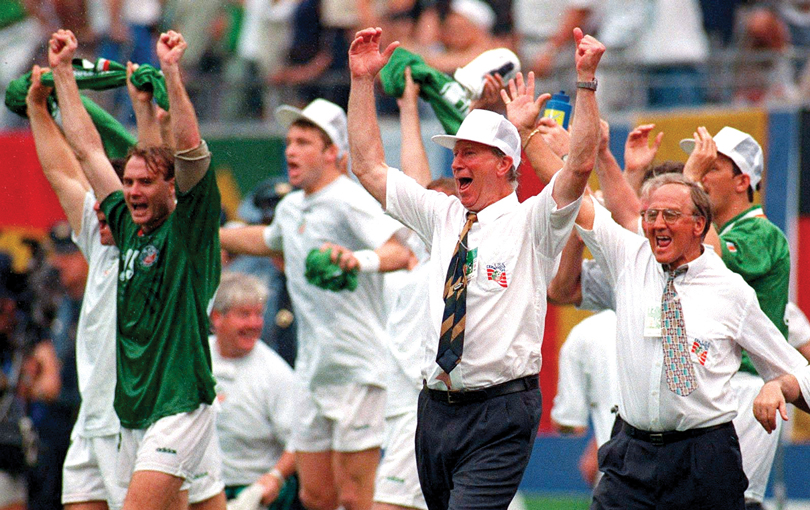
After taking over as Republic of Ireland boss in 1986, Charlton embarked on a recruitment drive. By accident, he unearthed the player who would score the two most famous goals in Irish football history.
“He came to see Oxford play at Villa Park in the League Cup semi-finals,” Ray Houghton tells FFT. “He’d come to watch John Aldridge, who had an Irish grandmother. In the players lounge after the game, John told him that my dad was born in Ireland, so Jack asked if I’d be interested in playing, too. I said I needed a few days to consider it. The next morning, I got a call from him saying, ‘Have you made your mind up yet?’”
The Glasgow-born midfielder joined up with the squad ahead of a Euro 88 qualifying campaign which featured three teams who had competed at the World Cup – Scotland, Bulgaria and semi-finalists Belgium.
“The team went back to basics,” continues Houghton. “His big thing was not to give the ball away. He liked to get the ball quickly in behind opponents, and put pressure on their defensive players high upfield. It was tiring and high tempo. There wasn’t any room for pretty stuff, especially from the back. He was asking guys used to passing the ball patiently at Liverpool and Manchester United to play a very different way, but we soon bought into it and results followed.”
Three months after a 1-0 win at Hampden Park against Scotland, Ireland beat Brazil by the same score in a home friendly. Charlton had quickly fashioned a special atmosphere. “It was like a club and we all bonded,” adds Houghton. “He was one of the lads – he fined some of the players for not inviting him to the pub one evening. What he didn’t know is that he wasn’t left out because he was the boss, it was because he never bought any drinks – in the whole time I knew Jack, I don’t think I ever saw him at the bar!”
Ireland won their last three qualifiers, and when Bulgaria surprisingly lost 1-0 at home to Scotland, the Boys in Green had reached their first major tournament.
Their first match at Euro 88 couldn’t have been scripted better: Charlton faced England, who hadn’t even replied to his job application when offering his services to succeed Don Revie in 1977. In Stuttgart, Ireland pulled off an upset to win 1-0.
“That result put Jack’s Ireland on the map and changed the country,” says Houghton, who nodded the winner. “Before that, Frank Stapleton had a testimonial for Ireland and only 10,000 people turned up. After we beat England at the Euros, David O’Leary had one and you couldn’t get a ticket.
“After that game, Jack walked over to me in the dressing room and said, ‘Never do that again’. I asked, ‘Score against the English?’
He replied, ‘No, score so early – that was the hardest 85 minutes of my life!’”
Ireland then drew 1-1 with the USSR, and came within eight minutes of knocking out the Netherlands, the tournament’s eventual winners. Wim Kieft’s cruel header sent the Irish home as national heroes.
"The Pope would have saved that"
Jack’s Army promptly qualified for their first World Cup. Their maiden opponents at Italia 90? England again, putting Charlton face to face with former protégé Gascoigne.
“Before the game, Gazza was sitting in the dressing room all on his own,” remembered Charlton’s son, John. “He said, ‘Go and get your father’. He was nervous and needed to speak to him. Dad walked into the England dressing room and tried to calm him down. He told Gazza to play his normal game, but said, ‘Just don’t play too bloody well!’”
Ireland drew all three group matches, then famously beat Romania on penalties in the last 16. Before their quarter-final clash with Italy, though, his team talk was disturbed by a legendary singer warming up nearby.
“Shut the f**k up!” shouted Charlton, as he opened the dressing room door. “You can’t say that, it’s Pavarotti!” he was told. “Never f**king heard of him,” huffed Charlton.
Prior to that, Big Jack took his squad to see the Pope, as well as welcoming a Guinness truck to the team hotel.
“A couple of pints turned to five or six, and we started playing the penny game – you put a penny on your forehead and hit the back of your own head until the penny falls off,” said Aldridge. “Jack wanted to have a go, so Andy Townsend placed a coin on Jack’s forehead – then took it off at the last second. Jack was winding his arms up like a windmill, belting the back of his head. People were absolutely pissing themselves – he must have whacked himself 10 times before he twigged and tried to clip Andy round the ear!”
The meeting with the Pope was memorable for several reasons, not least when Charlton nodded off mid-ceremony. “When Jack woke up, the Pope was performing the blessing,” Paul McGrath later recollected. “Jack thought the Pope was waving at him, so waved back.”
Townsend picks up the story. “After that, all 25 of us went to the Pope’s private quarters,” he tells FFT. “Pope John Paul II walked in and asked who our goalkeeper was. He then said to Packie Bonner, ‘When I was a young boy in Poland, I used to be a keeper, too, so I’ll keep an eye out for you’.
“During the game, Roberto Donadoni shot, Packie made a save, stumbled beyond a post and Toto Schillaci fired in the rebound. After the match, Jack told Packie, ‘The Pope would have f**king saved that’.”
Things got weirder when Ireland qualified for the World Cup again in 1994. “Jack was very aware that England hadn’t qualified, so the focus would be on us,” says Townsend. “We were building up to the first group game against Italy, and Jack turned to everyone on the bus after training and said, ‘The world’s press are focusing on you, so don’t do or say anything stupid’.
“He was being serious, then we all walked back into the hotel, and for whatever reason there was a Star Trek convention taking place. Jack was looking at Klingons walking around with pointed ears, thinking, ‘What the hell is going on here?’ We got into the lift and, of course, Captain Kirk and Spock also came in and stood next to Jack.
“His face was a picture. I don’t know if he’d ever watched Star Trek – he didn’t have a clue what was going on!”
Not everyone stayed within Charlton’s rules, however. “I brought a girl up to my room,” Tony Cascarino told FFT. “Some alarms went off, so the next morning Jack got the team together and said, ‘OK, who had the bird in their room last night?’ He was going nuts so I stayed quiet, but then I walked over to him and said it was me. ‘You stupid big bastard,’ he yelled. His face got redder, and I thought I was in real trouble.
“He dismissed me, then as I walked past him, he gripped my arm and asked, ‘Did she have big tits?’ I laughed and told him she did, actually. He said, ‘I love big tits’.”
Houghton scored the winner once again as Ireland beat eventual finalists Italy en route to the last 16. Big Jack had guided Ireland to three tournaments, and established himself as their greatest ever boss, before resigning in 1996. He could have been a great England manager, too, had the FA not rejected him.
“He would have done a good job,” insists Townsend of his former gaffer, who passed away in July, aged 85. “How long he would have lasted, though, with the way the English press were, I don’t know. Jack never waited to be sacked – when he wanted to leave, he just went. He most certainly could have done the job, but it wouldn’t have surprised me if one day you woke up and found he’d walked out of the door, got his fishing rod and was sat by the side of a lake somewhere.”
It was the sort of location where he spent a lot of his retirement, enjoying some peace and quiet away from Luciano Pavarotti and the Klingons. Jack Charlton lived quite a life. It was a life that established him as a legend, on both sides of the Irish Sea.
Subscribe to FourFourTwo today and get your first five issues for just £5 for a limited time only - all the features, exclusive interviews, long reads and quizzes - for a cheaper price!
NOW READ
RICHARD JOLLY France have to be favourites for Euro 2020, despite what the bookies say
LIST! The 100 greatest-ever club football badges
INTERNATIONAL Ireland didn't play attractive football when they had the players to - so why try it now?

Chris joined FourFourTwo in 2015 and has reported from 20 countries, in places as varied as Jerusalem and the Arctic Circle. He's interviewed Pele, Zlatan and Santa Claus (it's a long story), as well as covering the World Cup, Euro 2020 and the Clasico. He previously spent 10 years as a newspaper journalist, and completed the 92 in 2017.
